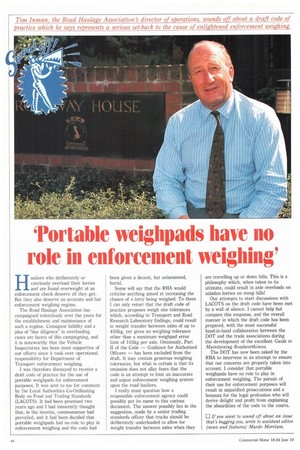'Portable weighpads have no role in enforcement weighing'
Page 48

If you've noticed an error in this article please click here to report it so we can fix it.
Hauliers who deliberately or carelessly overload their lorries and are found overweight at an enforcement check deserve all they get. But they also deserve an accurate and fair enforcement weighing regime.
The Road Haulage Association has campaigned relentlessly over the years for the establishment and maintenance of such a regime. Consignor liability and a plea of "due diligence" in overloading cases are facets of this campaigning, and it is noteworthy that the Vehicle Inspectorate has been most supportive of our efforts since it took over operational responsibility for Department of Transport enforcement weighing.
I was therefore dismayed to receive a draft code of practice for the use of portable weighpads for enforcement purposes. It was sent to me for comment by the Local Authorities Co-Ordinating Body on Food and Trading Standards (LACOTS). It had been promised two years ago and I had innocently thought that, in the interim, commonsense had prevailed, and it had been decided that portable weighpads had no role to play in enforcement weighing and the code had been given a decent, but unlamented, burial.
Some will say that the RHA would criticise anything aimed at increasing the chance of a lorry being weighed. To them I can only retort that the draft code of practice proposes weigh site tolerances which, according to Transport and Road Research Laboratory findings, could result in weight transfer between axles of up to 450kg, yet gives no weighing tolerance other than a maximum weighpad error limit of 105kg per axle. Ominously, Part II of the Code — Guidance for Authorised Officers — has been excluded from the draft. It may contain generous weighing tolerances, but what is certain is that its omission does not allay fears that the code is an attempt to foist an inaccurate and unjust enforcement weighing system upon the road hauliers.
I really must question how a responsible enforcement agency could possibly put its name to this curious document. The answer possibly lies in the suggestion, made by a senior trading standards officer that trucks should be deliberately underloaded to allow for weight transfer between axles when they are travelling up or down hills. This is a philosophy which, when taken to its ultimate, could result in axle overloads on unladen lorries on steep hills!
Our attempts to start discussions with LACOTS on the draft code have been met by a wall of silence. I cannot help but compare this response, and the overall manner in which the draft code has been prepared, with the most successful hand-in-hand collaboration between the DOT and the trade associations during the development of the excellent Guide to Maintaining Roadworthiness.
The DOT has now been asked by the RHA to intervene in an attempt to ensure that our concerns are properly taken into account. I consider that portable weighpads have no role to play in enforcement weighing. The pursuit of their use for enforcement purposes will result in unjustified prosecutions and a bonanza for the legal profession who will derive delight and profit from explaining the absurdities of the code to the courts.




















































































